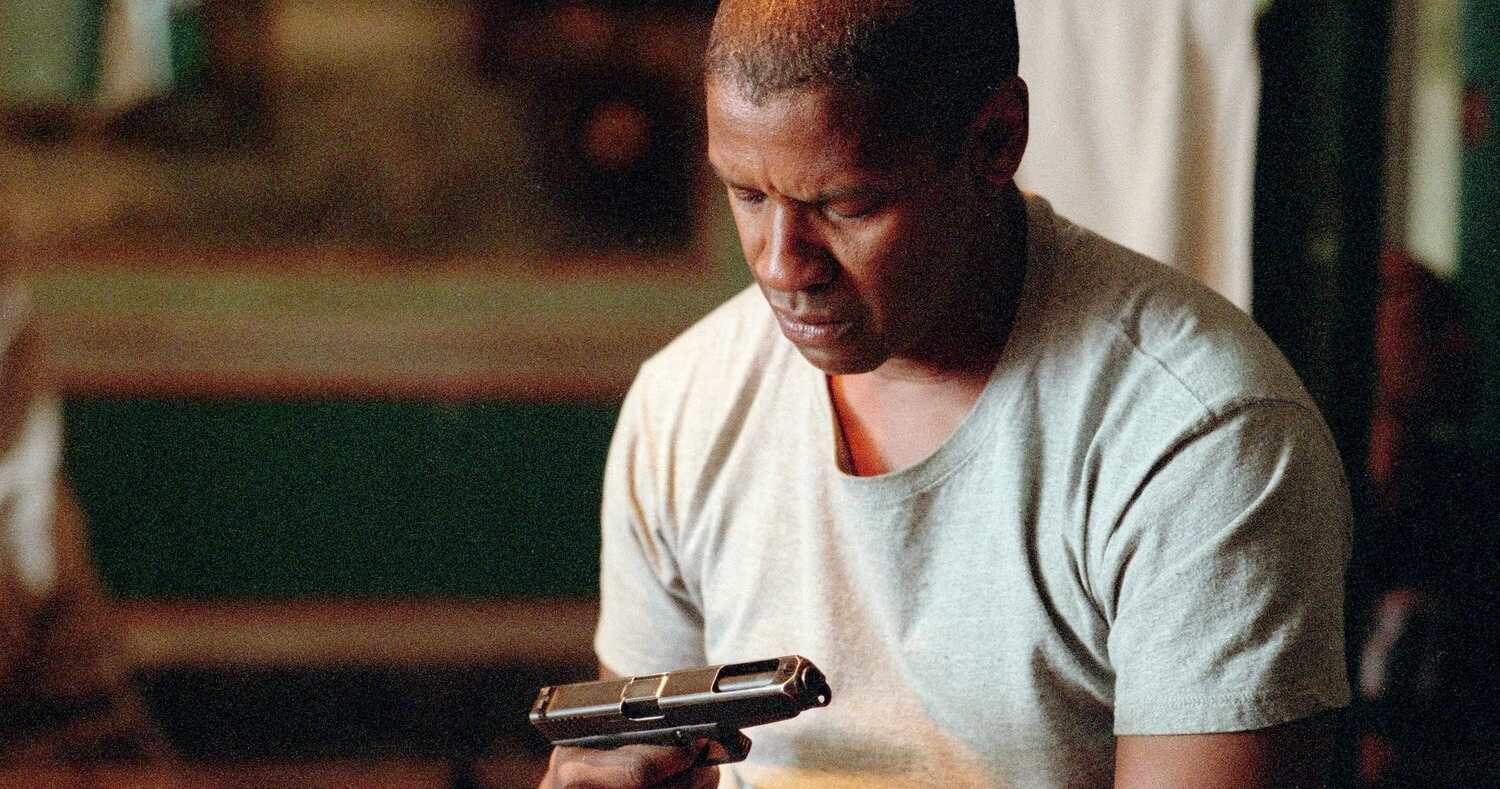Is John Creasy, The Character From Man On Fire, Actually Real?
John Creasy, a former marine turned bodyguard, is a purely fictional character portrayed by Denzel Washington in the 2004 action thriller film, "Man on Fire".
Creasy is a complex and enigmatic figure who struggles with his violent past and a deep sense of loss. Despite his hardened exterior, he possesses a strong moral compass and a desire to protect the innocent. In "Man on Fire", Creasy is hired to safeguard Pita Ramos, a young girl kidnapped by a ruthless gang in Mexico City. As he investigates the case, Creasy uncovers a web of corruption and violence that forces him to confront his own demons and make difficult choices.
The character of John Creasy has resonated with audiences worldwide due to his relatable humanity and unwavering commitment to justice. His journey in "Man on Fire" is a poignant exploration of redemption, sacrifice, and the enduring power of human connection.
- Sara Haines Twin
- Zahn Mcclarnon Kids
- Meg Nutt Onlyfans Leaks
- George Clooney Twins Photos 2024
- Moveirulz Ullu
Transition to main article topics:
John Creasy - Fictional Character
John Creasy, portrayed by Denzel Washington in the film "Man on Fire", is a purely fictional character. However, the character's complexity and relatability have led to discussions about his perceived authenticity.
- Fictional Portrayal: Creasy's character is a product of the film's narrative and does not exist outside the fictional realm.
- Complex Characterization: Despite being fictional, Creasy is a well-developed character with motivations, struggles, and a moral compass that resonate with audiences.
- Emotional Impact: The character's journey and sacrifices evoke strong emotions, blurring the lines between fiction and reality for some viewers.
- Cultural Influence: Creasy's portrayal as a protector and avenger has influenced popular culture and shaped perceptions of heroism.
- Exploration of Moral Dilemmas: Through Creasy's choices and actions, the film explores complex moral dilemmas and the consequences of violence.
In conclusion, while John Creasy is a fictional character, his realistic portrayal, emotional depth, and exploration of universal themes create a sense of authenticity that transcends the boundaries of fiction. The character's impact on audiences and popular culture further solidifies his place as a memorable and thought-provoking figure.
- London Breed Husband Picture
- Anna Malygon Only Fans Leaks
- Rita Faez Leak
- Hanna Uwu Leak
- Wentworth Miller Wife And Kids
Fictional Portrayal
The fictional portrayal of John Creasy underscores the distinction between cinematic characters and real individuals. Creasy's existence is confined to the film's narrative, and his actions, motivations, and relationships are shaped by the screenwriter's imagination and the director's vision. This fictional portrayal allows filmmakers to explore complex themes, create compelling storylines, and evoke strong emotions without being bound by the constraints of reality.
Understanding the fictional nature of John Creasy is crucial for media literacy and critical thinking. It prevents us from blurring the lines between entertainment and reality, and helps us appreciate the creative process behind storytelling. Moreover, it highlights the importance of distinguishing between factual information and fictional narratives, especially in the age of misinformation and fake news.
In conclusion, recognizing John Creasy as a fictional character is essential for understanding the nature of film and media. It allows us to fully engage with the narrative while maintaining a critical perspective, fostering a deeper appreciation for the art of storytelling and the importance of media literacy.
Complex Characterization
The complex characterization of John Creasy is a crucial component that contributes to the perception of authenticity and relatability, despite his fictional nature. Creasy's motivations, struggles, and moral compass mirror real-life human experiences, making him a relatable and emotionally resonant figure.
Creasy's struggle with his violent past and search for redemption is a common theme in human narratives. His desire to protect the innocent, even at great personal cost, taps into our innate sense of justice and compassion. Audiences can empathize with Creasy's inner turmoil and root for his success, despite his flaws and the fictional context.
The practical significance of understanding Creasy's complex characterization lies in its ability to evoke empathy, challenge moral boundaries, and explore the complexities of human nature. Through Creasy's journey, we are forced to confront our own beliefs, values, and the consequences of our actions.
In conclusion, the complex characterization of John Creasy is integral to the perception of his authenticity. It allows audiences to connect with a fictional character on a human level, fostering emotional resonance and encouraging critical reflection on universal themes and moral dilemmas.
Emotional Impact
The emotional impact of John Creasy's journey and sacrifices plays a significant role in blurring the lines between fiction and reality for some viewers. The character's struggles, pain, and ultimate redemption resonate deeply, creating a sense of emotional connection that transcends the boundaries of fiction.
Real-life examples abound of fictional characters eliciting strong emotions from audiences. Characters like Atticus Finch in "To Kill a Mockingbird" and Oskar Schindler in "Schindler's List" have inspired countless individuals to reflect on their own moral compasses and strive for justice. Similarly, John Creasy's unwavering commitment to protect the innocent, even at the cost of his own life, has left an indelible mark on viewers.
Understanding the emotional impact of fictional characters is crucial for several reasons. First, it highlights the power of storytelling to evoke empathy and challenge our perceptions of the world. Second, it underscores the importance of critical engagement with media, recognizing that emotional responses can influence our thoughts and actions. Finally, it emphasizes the enduring human need for heroes and role models, even within the realm of fiction.
In conclusion, the emotional impact of John Creasy's character contributes to the perception of his authenticity by blurring the lines between fiction and reality. It reinforces the power of storytelling to shape our emotions, values, and actions, highlighting the importance of critical media literacy and the enduring human desire for heroes and role models.
Cultural Influence
The cultural influence of John Creasy's character extends beyond the film itself, shaping perceptions of heroism and influencing popular culture. Creasy's portrayal as a protector and avenger has resonated with audiences, leaving a lasting impact on society.
- Heroic Archetype: Creasy embodies the classic heroic archetype, a lone warrior fighting against overwhelming odds to protect the innocent. This archetype resonates with audiences, as it taps into our innate desire for justice and protection.
- Vigilante Justice: Creasy's actions in the film blur the lines between traditional law enforcement and vigilante justice. His willingness to take matters into his own hands has sparked discussions about the limits of self-defense and the role of individuals in upholding justice.
- Media Portrayal of Heroes: Creasy's character has influenced the portrayal of heroes in film and television. His complex motivations and moral struggles have added depth to the traditional hero figure, making them more relatable and emotionally resonant.
- Cultural Conversations: Creasy's actions have generated cultural conversations about heroism, morality, and the consequences of violence. The film has sparked debates about the ethics of revenge, the nature of justice, and the responsibilities of those who possess power.
In conclusion, John Creasy's cultural influence highlights the enduring appeal of heroic archetypes and the complex relationship between heroism, justice, and violence. His portrayal has shaped perceptions of heroism in popular culture and continues to spark discussions about the nature of good and evil in our society.
Exploration of Moral Dilemmas
John Creasy's character in the film "Man on Fire" serves as a vehicle to explore profound moral dilemmas and the far-reaching consequences of violence. Creasy's journey confronts audiences with ethical complexities that transcend the realm of fiction, compelling us to question our own moral boundaries.
- The Morality of Revenge:
Creasy's quest for vengeance raises questions about the morality of taking the law into one's own hands. His actions force us to grapple with the cyclical nature of violence and the potential for it to corrupt even the most well-intentioned individuals.
- The Value of Innocence:
The film highlights the sanctity of innocence through Creasy's protective relationship with Pita Ramos. Creasy's unwavering commitment to safeguard her innocence challenges us to prioritize the protection of the vulnerable and confront the moral implications of exploiting or harming them.
- The Limits of Justice:
Creasy's pursuit of justice pushes the boundaries of acceptable conduct. His actions challenge the traditional legal system and raise questions about the limits of justice and the potential for it to become distorted by personal motives or a desire for retribution.
- The Consequences of Violence:
The film unflinchingly depicts the devastating consequences of violence, both physical and emotional. Creasy's actions have far-reaching repercussions, affecting not only himself but also those around him. Through his character, the film explores the ripple effects of violence and its lasting impact on individuals and society as a whole.
In conclusion, the exploration of moral dilemmas through John Creasy's character in "Man on Fire" invites us to confront fundamental questions about justice, morality, and the consequences of violence. Creasy's journey serves as a powerful reminder of the complexities of human nature and the enduring need to navigate moral challenges with empathy, compassion, and a commitment to upholding universal values.
FAQs Related to "Is John Creasy a Real Person?"
This section addresses common inquiries regarding the fictional nature of John Creasy and provides informative answers to clarify misconceptions.
Question 1: Is John Creasy based on a real person?
Answer: No, John Creasy is a purely fictional character created for the film "Man on Fire." The character's backstory, motivations, and actions are products of the screenwriter's imagination and do not correspond to any real individual.
Question 2: Why is it important to recognize John Creasy's fictional nature?
Answer: Understanding that John Creasy is fictional is crucial for several reasons. It prevents confusion between factual information and cinematic storytelling, fosters critical thinking about media consumption, and highlights the imaginative power of fictional narratives to explore complex themes and emotions.
Summary: John Creasy's fictional portrayal allows filmmakers to delve into universal human experiences, moral dilemmas, and the consequences of violence without being constrained by reality. Recognizing his fictional nature enables us to appreciate the film's narrative and thematic depth while maintaining a critical perspective on media consumption.
Conclusion
Through an exploration of the fictional character John Creasy, this article has examined the interplay between cinematic narratives and real-life experiences. Creasy's characterization and portrayal in "Man on Fire" underscore the power of storytelling to evoke strong emotions, challenge moral boundaries, and explore universal themes.
While John Creasy may not exist in the physical realm, his impact on audiences is undeniable. His journey serves as a reminder of the enduring human search for justice, the importance of protecting the innocent, and the profound consequences of violence. Understanding the fictional nature of Creasy allows us to appreciate the film's artistic merits and engage critically with its exploration of complex moral dilemmas.

John Creasy's true story — His origins detailed

John Creasy, who ushered in the thriving modern era for geology at

Is John Creasy A Real Person?